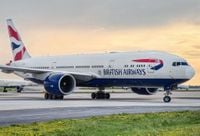On the evening of October 9, 2025, a routine British Airways flight from Istanbul to London took a dramatic turn, forcing 142 passengers and crew to confront an unexpected emergency. Flight BA603, an Airbus A320, was diverted to Bucharest Henri Coanda International Airport after pilots reported a suspected technical issue—an event that would soon spark confusion and conflicting accounts over the presence of smoke onboard.
The incident unfolded as the aircraft was cruising toward its scheduled destination. At 5:50 p.m. local time, the pilots requested emergency landing clearance, citing precautionary concerns over a possible technical malfunction. Less than half an hour later, at 6:14 p.m., the plane touched down safely in Romania’s capital, according to statements from airport officials and as reported by multiple outlets, including The Associated Press and local Romanian authorities.
What happened next was a flurry of activity. Emergency response teams, including medical crews, boarded the aircraft immediately after landing. Romanian Health Ministry officials quickly confirmed the presence of smoke on the plane, a detail that would become the center of a puzzling discrepancy. According to the ministry, "Four people are in poor health, possibly being smoke-intoxicated, and are receiving medical assistance on site," though it was later clarified that "they did not require medical care." All 142 passengers were evacuated safely, and no one needed hospitalization.
British Airways, meanwhile, offered a slightly different version of events. In a statement to The Associated Press, the airline emphasized, "The safety of our customers and colleagues is always our top priority and our crew made the decision to divert as a precaution due to a suspected technical issue." The airline added, "The aircraft landed safely and customers disembarked as normal." British Airways also stated, "We received no reports of smoke on board or hospitalisations. We're sorry to our customers for the disruption to their journeys and our teams are working to get them on their way again as quickly as possible."
This divergence between the airline’s account and that of Romanian authorities left more questions than answers. While the Health Ministry stood by its confirmation of smoke and possible smoke inhalation, British Airways maintained that their crew had not reported smoke and that no passengers required further medical attention. The discrepancy remains unresolved, and the exact nature of the suspected technical issue has yet to be publicly detailed by the airline.
Despite the confusion, what’s clear is the sequence of decisive actions taken by the flight crew and emergency teams. As reported by BBC and other outlets, the pilots’ prompt decision to divert the flight was driven by a commitment to safety. The presence of emergency responders on the ground ensured that any potential health issues were addressed immediately, even if, in the end, no one needed hospital care. Passengers were evacuated without incident, and the disruption, though significant, did not escalate into a more serious emergency.
For the passengers aboard BA603, the experience was surely unsettling. One moment they were en route to London; the next, they found themselves in Bucharest, shepherded off the plane by emergency crews. Yet, the professionalism of the airline’s staff and the swift response of Romanian authorities meant that everyone was safe and accounted for—a testament to the rigorous protocols airlines and airports have in place for such scenarios.
British Airways’ handling of the situation, particularly its communication with passengers and the public, reflects the challenges airlines face when emergencies arise. In its official statement, the airline apologized for the disruption and reassured affected customers that their journeys would resume as quickly as possible. "We're sorry to our customers for the disruption to their journeys and our teams are working to get them on their way again as quickly as possible," a spokesperson said. The airline’s flight status page also showed the flight as having been diverted, displaying a message of apology and updates for concerned travelers.
The incident has brought to light the sometimes-murky process of incident reporting in aviation. The conflicting reports about smoke underscore the complexities involved in emergency situations—where information comes in rapidly, sometimes from multiple sources, and not all details align perfectly. While British Airways insisted that no smoke was reported by its crew, Romanian officials stood by their assessment, pointing to the potential for smoke inhalation among a handful of passengers.
It’s not uncommon for such discrepancies to occur in the immediate aftermath of an emergency. Investigations by both airlines and local authorities often follow, aiming to clarify what happened, what caused the technical issue, and whether any procedures need to be updated to prevent future incidents. As of now, British Airways has not provided further details about the technical problem that prompted the emergency landing, leaving the public to wait for a more comprehensive explanation.
For those who follow aviation news, this event serves as a reminder of the critical importance of well-trained crews and robust emergency protocols. The pilots’ decision to divert and the rapid deployment of emergency services on the ground likely prevented a more serious outcome. In the world of commercial aviation, where millions of passengers fly safely every day, such incidents are rare but highlight the layers of safety built into every flight.
The passengers of flight BA603, though undoubtedly inconvenienced, were ultimately unharmed—a fact that British Airways and Romanian authorities have both emphasized. The airline’s focus on safety, coupled with the efficiency of local emergency responders, ensured that what could have been a much more serious event ended with everyone safe and sound.
As investigations continue and more details emerge, the incident will likely be studied by aviation professionals as a case study in emergency response and crisis communication. For now, both British Airways and Romanian officials can point to a swift, coordinated response that put passenger safety first, even amid uncertainty and conflicting reports.
In the world of air travel, unpredictability is always a possibility. But as this incident shows, preparation, professionalism, and clear communication can make all the difference when the unexpected happens.





